Resident Brits in Croatia: Wrongly Stamped Passport Won't Affect Rights
September the 1st, 2021 - We have been receiving many reports of resident Brits in Croatia having their UK passports stamped at the border when entering and/or exiting Croatia. While this shouldn't be happening, these stamps are just a meaningless little souvenir and will not have any effects on your rights under the Withdrawal Agreement (WA).
Brexit has been done and dusted, and while there are still growing pains, the ongoing global coronavirus pandemic has overshadowed most of the infighting and arguing between the bloc and the Northern European island nation. With the economic part of the new relationship between the bloc, of which the UK was a powerful member for 40 years, and the UK still finding its feet, the situation with citizens' rights which plagued those affected for years has all but been cleared up.
There are, just like with everything else, certain issues still. One issue is resident Brits in Croatia having their British passports stamped upon entry and exit. It is important to state that this isn't happening all the time, but it is still happening where it shouldn't be. Here's how you can try to avoid it, and if it does happen, don't sweat it.
If you are a resident Brit in Croatia covered by the Withdrawal Agreement, you'll already (hopefully anyway) have your new ID/residence card which documents that right under Paragraph 4, Article 18 of the Agreement. This protects you and your acquired rights as you had exercised them under the freedom of movement laws which once applied to you as an EU citizen.
When crossing the Croatian border (either entering or exiting), you should always show your Croatian ID/residence card along with your British passport to the border guard in order to avoid any questioning as to your reason for entry/your reason for having been in the country and to showcase your rights.
We've been receiving reports, as stated previously, from Brits who are covered by the WA, some of which had permanent residence before Brexit even happened, who are now having their passports stamped by Croatian border guards. Naturally, this makes them worry for their rights and wonder why they, as legal tax paying residents, are being lumped in with visiting British tourists.
We have investigated why this is happening and have been assured that although it shouldn't be, it isn't anything to be concerned about and it doesn't affect your rights in any way whatsoever. The stamps can be looked upon as a little souvenir which carry no weight. As long as you can evidence that you are a legal resident of Croatia, any stamps you might have collected on your trips in and out of Croatia are meaningless.
Hopefully, as the consequences of Brexit settle and the UK and the EU's new relationship becomes the norm, such situations will stop happening. In any case, there is no need to worry about Croatian passport stamps in the UK passports of resident Brits in Croatia.
If you're a serial stamp collector despite having shown the border guard your ID/residence card and this article fails in easing your concerns, you can contact the British Embassy in Zagreb and voice your worries by clicking here.
For more, make sure to follow our politics section.
Friends of Croatia: British Embassy - Brexit an Opportunity to Deepen Already Good Relationship
May 20, 2021 - The fifth article in the series "Friends of Croatia: British Embassy", saw TCN reporter Ivor Kruljac sit down with the UK Ambassador Andrew Dalgleish and discuss all things regarding diplomatic relations between the UK and Croatia. Diplomatic relations are, overall, really good and developing well, with Brexit being a challenge, but also an opportunity for deeper bilateral cooperation between the two European nations.
The diplomatic relations between the UK and the Republic of Croatia were formally established on June the 24th, 1992.
Almost 29 years later, I found myself in front of the Ambassador's residence and being warmly greeted by Snježana Vukić, the British Ambassador's advisor for communications. If you're inclined to think in stereotypes, you would expect a cup of tea, but instead, the cup of coffee with the creamy flat white texture turned out to be a much better beverage during the interview—both for me and for the Ambassador.
''We can sit wherever you like'', said Ambassador Andrew Stuart Dalgleish as he welcomed me inside the premises. A warm, kind, competent communicator that evened out the serious conversation about diplomatic topics with occasional humorous remarks to ensure both had an enjoyable and informative talk. The pins of both British and Croatian flags on his left coat lapel turned out to be a visual clue to the notion the friendship the UK and Croatia has long since held is still going well.
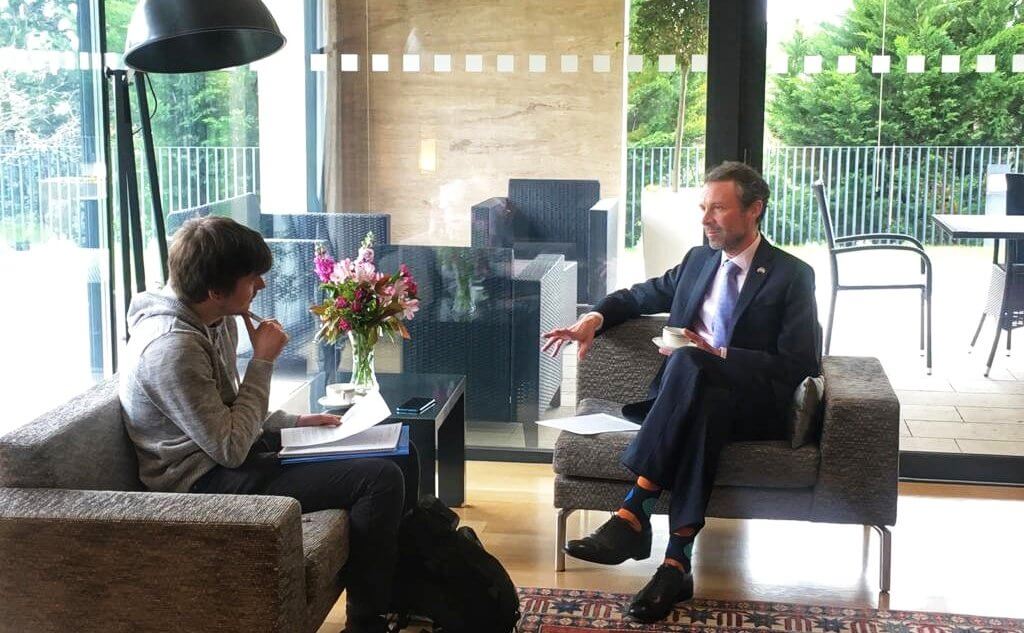
TCN reporter Ivor Kruljac with Ambassador Andrew Dalgleish © British Embassy Zagreb
Croatia and UK sharing western values
Andrew Dalgleish has served the UK as the Ambassador in Croatia since July 2016. He graduated with First Class Honours Degree in European Law at the University of Warwick, which included a year at Bordeaux University IV studying French Law. From 1998-1999 he worked in the Department of Social Security. His extensive knowledge of European law saw him work in UKREP (the United Kingdom Permanent Representation to the European Union) from 1999 to 2004, firstly as the Second Secretary for Social Affairs, and from May 2001 as a First Secretary for the Environment.
That same passion for the environment led him to DEFRA (Department for Environment, Food & Rural Affairs), where he was the Project Manager for the Climate Change effort during the UK Presidency of the EU, and he also represented the EU in UNFCCC plenary meetings. In his service to DEFRA from 2006 to 2008, he participated in the creation of the Office of Climate Change (2006), and moved to be the Deputy Head of Group, in Environmental Land Management too. From 2008 to 2011, Dalgleish continued working as the Head of the European Union Strategy Department, where he held preparations ahead of the Prime Minister’s European Council briefings and assisting other ministries in shaping deliverable policies; coordinating influencing strategies and lobbying efforts within the EU.
''I should tell you, I'd never been to Croatia before I arrived here professionally, and I'm one of those rare British people who hasn't been here on holiday“, Dalgleish began as I asked him about his impressions of the country, and of course, of Croats.
''What struck me the most was the warmth of the people, the welcome, general sense of friendliness. Croats are really proud of their country, and quite rightly so, and they also really want you to love the country too,'' said the Ambassador, adding that the Croats he met took him to lots of places and restaurants where he discovered various new dishes.
He continued that one of the delights of Croatia in his opinion is its variety, and he finds it impossible to pick one location that fascinated him the most.
''I remember going to Vučedol near Vukovar, and it was mindblowing. The walking that I can do in Žumberak, not far from Zagreb is fantastic. You go to Brijuni and you have Roman ruins, or you go to Poreč and you've got the basilica there, or Vis, which is a paradise,'' he stated in his list.
His description of Croats as warm and friendly seems to demonstrate to what we could call Croatian values. But, what are British values? When asked this question, Dalgleish argued that these are habits we may consider to be national characteristics, but they aren't values, per-se.
''Brits are very proud of the idea that we believe in fair play, that will we do the right thing even if we lose the game. Maybe that's why we're terrible at sports,'' the Ambassador said with a touch of humour as he was describing the national characteristics of British citizens.
While stating that Croats should be asked what the UK is most famous for in Croatia, as an Smbassador who frequently talks to Croats, he did manage to come up with some conclusions on the issue.
''Football, clubs such as Chelsea or Manchester City, but also the British sense of humour. Croats laugh at similar things as we do. So much British TV is here, and the cultural exchange is really, really important as well,'' said the Ambassado,r referring to cult shows such as Only Fools and Horses (Croatian: Mucke).
''The Royal Family is very recognisable here, too. I think lots of interest and affection is shown for the Royal Family, and of course our brilliant 'weather' “, the Ambassador added.
When it comes to joint values, the Ambassador noticed that Croatia and the United Kingdom share many opinions that are neither Croatian nor British values, but rather a Western, European, or even Transatlantic view of the world.
''This encompasses a wide range of things that we very often take for granted but which are the foundations of our societies", explained the Ambassador, citing examples the freedom of the media or the rule of law.
''The democracies we live in, embrace and find to be a really important foundation are what we need to protect and defend for the sake of our societies.''
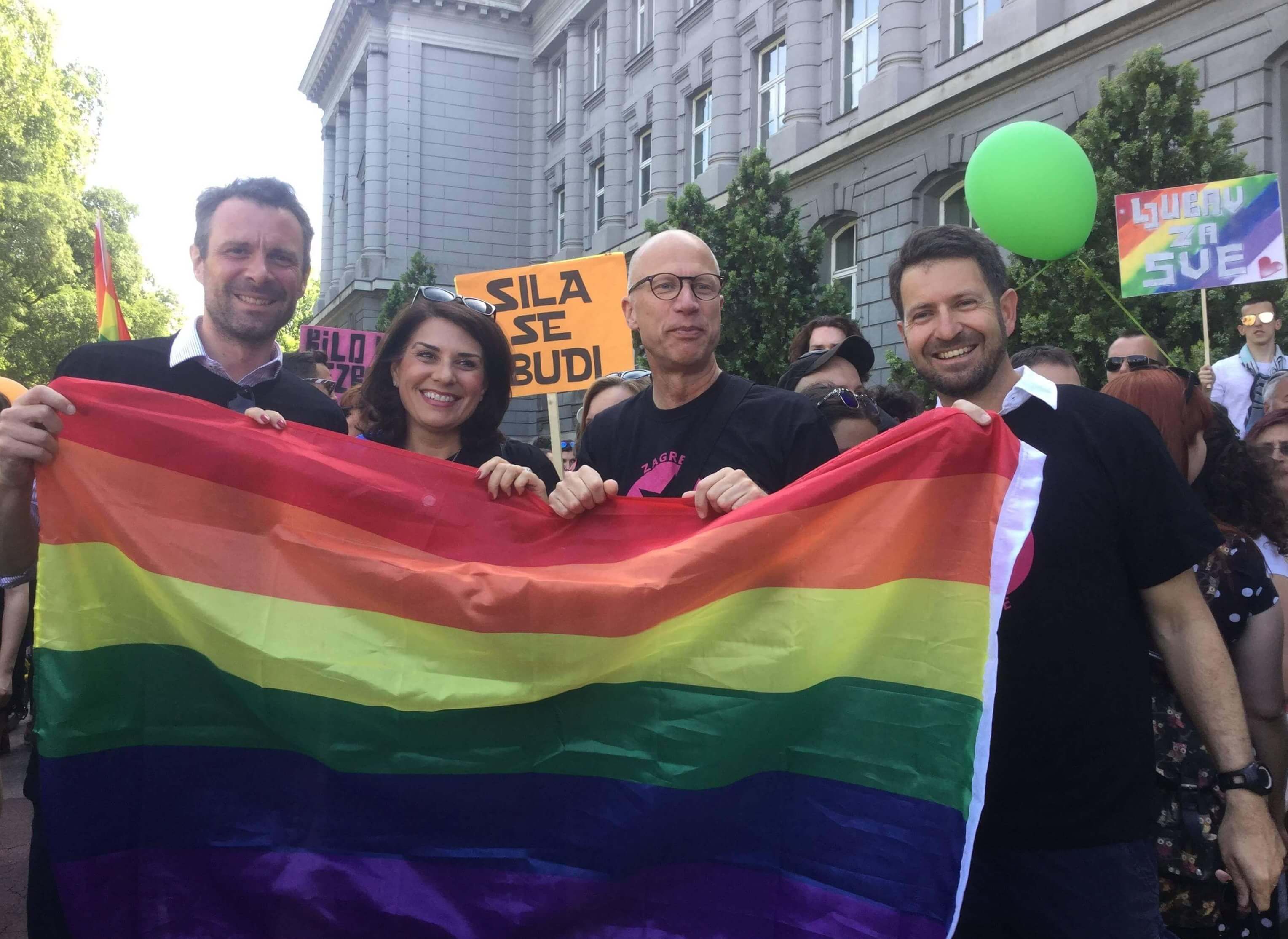
Zagreb Pride, Ambassador Dalgleish with other diplomatic colleagues during Zagreb Pride © British Embassy Zagreb
Things could be better at the commercial level, but there have been improvements...
The values ambassador Dalgeish described are the basis of diplomatic relations between Britain and Croatia, but how good is this relationship, actually? Where is it at its best, and where is it at its worst, where can things be better?
''The starting point is that diplomatic relations are really, really good, and I feel lucky that the cooperation our two countries enjoy is overwhelmingly positive,'' said the Ambassador. He added that as in any close relationship, two countries might disagree about something, but to the British Ambassador, being able to disagree and be fine with that is also a sign of a strong relationship.
''One great expression of our cooperation is NATO where we're really good, very close partners,'' continued the Ambassador, even referring to the recent DEFENDER-Europe-21 exercise in Zadar.
In addition to that, the recent visit of Royal Air Force Aerobatic Team to Croatia's Krila Oluje Pilots is also a good sign of cooperation and mutual friendship.

The Royal Airforce Aerobatic Team and the Ambassador © British Embassy Zagreb
''Croatia occupies an almost unique position in terms of expertise that it can give on Southeastern Europe, as well as comprehensive understanding of what is a very complicated situation in this region,'' he said.
''All of this is very good, strong and positive, and it makes a global impact, and it's not just about how our two countries get along,'' he said.
The Ambassador also added that both Croatia and the UK are members of the Global Media Freedom Pledge and stand for freedom in the media. He also works very closely with both the Croatian Government and Croatian president Zoran Milanović to promote awareness of the threat of climate change.
''You'd expect me to say I communicate the most with the Ministry of Foreign Affairs, and it would be true, it's where diplomatic relations are grown in a formal way. But I also communicate with all branches of the Government, with Parliament and with Pantovčak. Just today, I've been to the ''Dr Fran Mihaljević'' Clinic for Infectious Disease in Zagreb where I talked with its director, Professor Alemka Markotić, about what we can do about COVID-19“, added the Ambassador.
However, as expected, there are areas in which British-Croatian cooperation could be much better.
''Where I'd like things to be better, speaking very frankly, is in commercial relations. The UK has been less present on Croatian market and less accessible due to simple geography, especially when compared to the likes of Austria or Germany. When I arrived here, this is where I said I'd want to try to make a difference. I have made a difference, I hope. A small difference, but its a difference in the right direction, and the commercial relationship is better for that today,'' said the Ambassador.
These small steps saw trade in goods between the United Kingdom and Croatia increase by about 10% in the past few years, a good indicator of how things have been advancing, regardless of the concerns in the past that Brexit might affect it negatively.
''We've also seen investments from the Croatian side into the UK increase in the past few years – for example, Mate Rimac has just opened his research & development centre in the UK – we did help facilitate that through our Department for International Trade (DIT)“, added Ambassador.

UK Minister Greg Hands and Ambassador Andrew Dalgleish with Mate Rimac in Rimac Automobili © British Embassy Zagreb
In addition, the Ambassador used every opportunity to facilitate business and trade contacts between the UK and Croatia. When UK State Secretary in the Ministry of International Trade, Greg Hands, visited Croatia last month, the Ambassador hosted a dinner for him with several leading Croatian business figures for both sides to explore how they might further improve business connections between the two countries.
On top of that, the recent confirmation from the Justice Ministry that British citizens may purchase property in Croatia only further benefited the development of trading between the two European countries.
Leaving the table for face to face conversation
The cooperation Ambassador Dalgeish described sounds great, but when it comes to diplomatic relations with the UK, the elephant in the room screams out in need of a special mention. Brexit remains a hot topic for the British public, and as Croatia is a member of the EU, what changes can Croatia expect in diplomatic relations with the UK as the European island nation which chose to step away from the bloc?
Dalgleish sees Brexit both as a challenge and as an opportunity to deepen diplomatic relations between the UK and Croatia.
''With 28 members states as it was before, you had so many people around the table that when ministers came together for a council meeting, there were just too many people to have a meaningful conversation one on one. So you'd say ''see you in Brussels'', and you would, and you'd wave, and you'd smile, and you might even say hello. But you don't have a meaningful conversation all the time,'' said Ambassador Dalgeish from his own recollection as he spent a lot of time in Brussels.
''We aren't at that table anymore. That means we're going to have to make more of an effort but also that we will have the opportunity to build a more meaningful relationship with Croatia and I think that's quite exciting for me in the job that I do,'' said ambassador Dalgleish calmly but optimistically.
''Whereas before, our bilateral business might have been conducted during these convenient moments in Brussels at these meetings, that doesn't happen anymore. Now, we will hold them in London, and we will hold them in Zagreb. I think that's quite the opportunity to build something more meaningful than what we had in Brussels,'' stated the Ambassador.
As the UK has a massive impact on the world and can boast of very strong diplomatic relations with other big players on the geopolitical stage, I wondered how important the relationship with Croatia actually is, from the UK's point of view, and in regards to the country's interest in global affairs.
''We look at Croatia as a global partner, and not just from the point of what we get from this bilaterally, but in what we're doing together to make a difference; Croatia sits as a partner,'' the Ambassador pointed out.
Already having mentioned the importance of Croatia's knowledge on Southeastern Europe and the instances of good cooperation through NATO, and issues such as climate change or COVID-19, the British Ambassador's claims are evidently backed up.
''I was sent here by the Foreign Secretary with a very serious mission to deepen the strength of the cooperation that we enjoy. It's a very important mission for me, and I think that's a reflection of how seriously we take the relationship with Croatia,'' confirmed the Ambassador.
The British Royal Family has always been very welcome in Croatia
The Ambassador already mentioned cultural exchange, and the British Embassy as an institution plays a significant role in the cultural promotion of the country. But, given the UK consists of four nations: England, Scotland, Wales, and Northern Ireland, is it possible to represent all these cultures equally? Being Her Majesty Queen Elisabeth II's Ambassador and representing the United Kingdom of Great Britain And Northern Ireland, Dalgeish shows his dedication to the job by equally representing all of the UK's four nations.
''We will proudly fly the St. George's Cross when it's St George's Day for England, but also the Saltire (Scottish flag), when it's St. Andrew's Day. I wouldn't say there is one element of the four nations that is dominant,'' said the Ambassador.
Culture is heavily linked with history, and the UK has been known in the past as a vast empire with colonies that are sovereign independent countries today. As Croatia was never colonised by the UK, are there any differences between the UK's relations with Croatia compared to other countries?
''The UK has a very long list of diplomatic relations, both with the countries who are part of Commonwealth, who were previously colonies, and with countries who were not colonised. So, there's no difference in forming a relationship with Croatia in comparison to such countries. There's nothing I can do about what happened in 1600's or 1700's, but I want to see what we can do in 2021,'' said the Ambassador, stating that the Ambassador's job is to look ahead, not backwards, to work on building the future, while acknowledging all the sensitivities of the past.
As the Ambassador already mentioned, his regular cooperation with the official bodies of the Republic of Croatia is the formal level of communication, while cultural exchange also has a key element in non-formal communication, particularly in education.
''I love going to schools. Talking to the kids about what they think about the UK, and what can they teach me about Croatia, and going to English lessons and causing chaos,'' said the Ambassador on his experiences with the school system in Croatia.
With the mention of the school system in Croatia, I couldn't help but recall my experience in education. Croatians seem to be quite talented when it comes English, but it is mostly pushed towards the American version of English.
''Oh yes I know, it's tragic,'' Ambassador Dalgleish joked in response when I shared my recollections.
He continued by saying that he is happy to see Croats speaking English so excellently, and he doesn't mind what version they learned, nor does he have any intention to have British English compete with American English.
''I don't hear too many American accents when talking to Croats, maybe it has something to do with British TV shows, maybe it doesn't, I don't know. But either way Croats should be very proud of how well they speak English,'' he concluded.
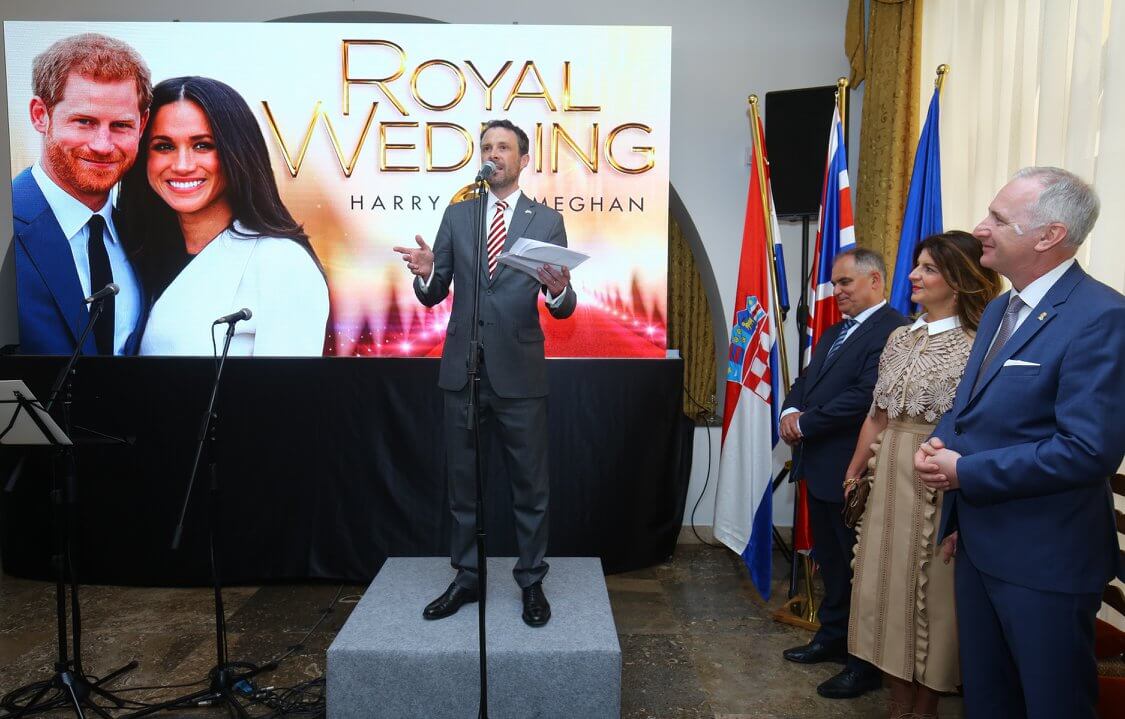
Ambassador Dalgleish on the Royal Wedding Party in Split © British Embassy Zagreb
As also already mentioned, the Royal Family is a big part of the of the fabric of Britain as it is a parliamentary monarchy.
The Royal family, particularly Prince Charles and Duchess Camilla seem to be very fond of Croatia indeed. Their last visit back in 2016 (following the Prince's earlier visit in 1996) saw the meeting with former Prime Minister Tihomir Orešković, former President Kolinda Grabar Kitarović, for whom Prince Charles highlighted his particular interest in the Croatian economy, as well as an interest in investing in Croatian youth. They also attended the commemoration of the 400th anniversary of the death of the famous English writer and poet William Shakespeare at the Croatian National Theatre (HNK) in Zagreb.
''Their Christmas card even had a photo of them with the members of a folk band from Osijek“, said Ambassador Dalgleish referring to the photo the British Royals took with the dancers of the HKUD 1862 ensemble.
And as Glas Slavonije reported, Osijek is very special to Prince Charles as his Great Grandfather Franz von Teck was born there.
Most recently, however, the Royal Family suffered a tragic loss as the much-loved Prince Philip passed away. Croatian Prime Minister Andrej Plenković expressed his deep condolences to Queen Elizabeth II publicly on Twitter, but as the Ambassador pointed out, he also sent condolences through official channels. Social media and overall technological progress now allows world leaders to communicate more directly, but it doesn't diminish the role of the British Embassy.
''Everyone who wanted to express their condolences, expressed them, from Pantovčak, to Parliament and the Government. Social media is an additional tool for us regarding public statements, but of course, embassies remain here for those sensitive issues that need to be discussed Government to Government, not over social media. We're also here for our citizens, and we can't be present in the whole country, so travelling, but also social media, are also very important here,'' explained the Ambassador.
The always attractive Dubrovnik was found to be the best example when it comes to culture in the country, as Game of Thrones and Star Wars were filmed there.
In the UK, the film industry, in addition to private incentives, gets financial support from the state, as the British Film Institute (BFI) is sponsored by a Government department. Following the examples of Star Wars and GoT, could there be more promotion from the BFI of Dubrovnik or Croatia in general as a good filming location?
''I don't really need to say anything about Dubrovnik. Dubrovnik speaks for itself, and more Brits visit Dubrovnik annually than anyone else,'' said the Ambassador with delight.
But if Dubrovnik did happen to need a good word or two; the Ambassador stated that he is not the tourist bord, and promoting Dubrovnik is not part of his duties.
''If someone from the UK contacts me and says that wants to film anywhere in Croatia, but is facing problems, then I'm here. But in general, the less I need to intervene, the better“, said the Ambassador adding that he found out about UK film producers filming in Croatia after it had already happened. One of the more recent examples of that was the filming of the ''The Ipcress File'' series in Zagreb, and the fact that the ambassador didn't need to intervene again only proves the steady and good relations between the nations.
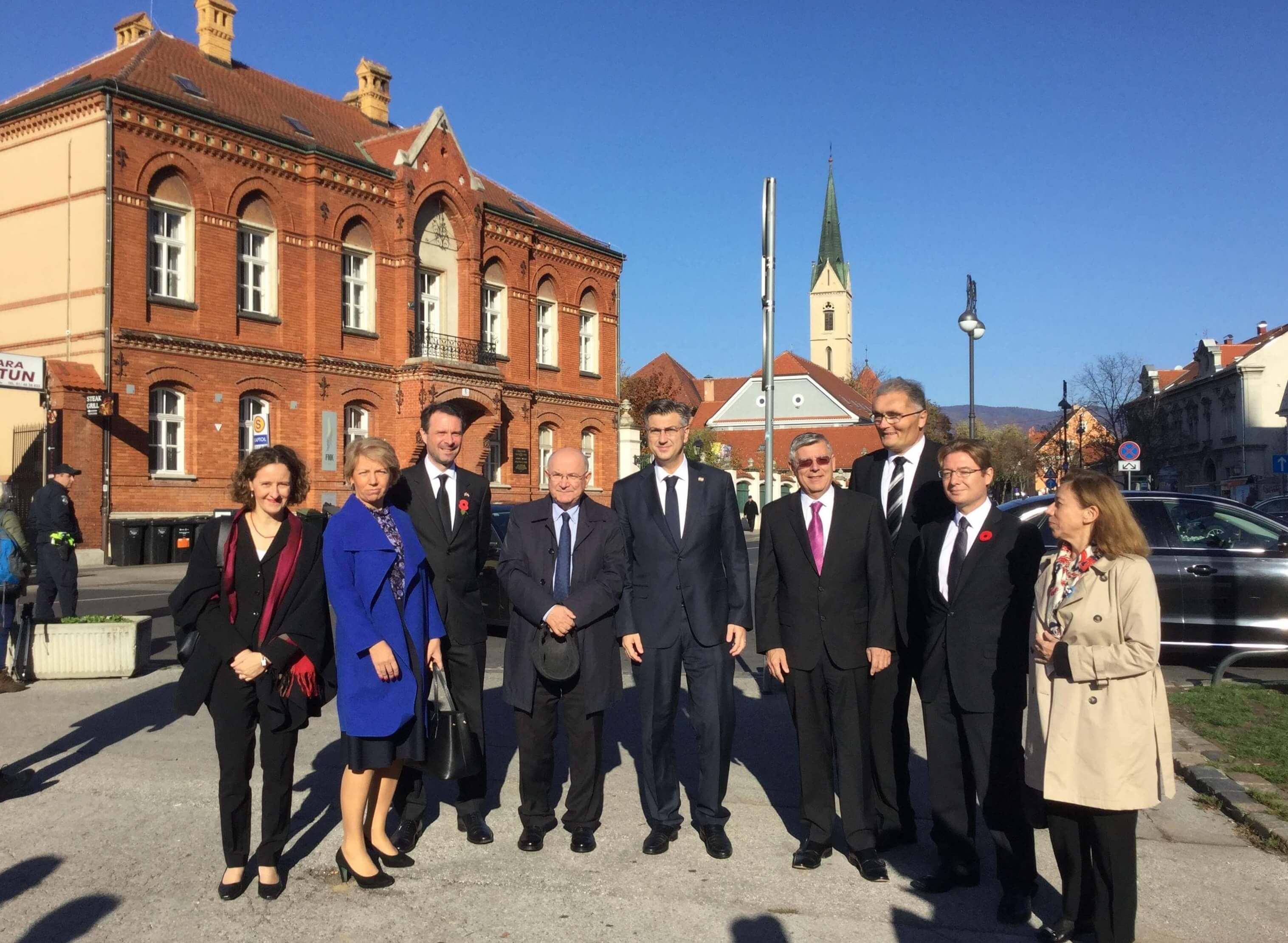
Ambassador Dalgleish, other Ambassadors and Croatian officials attending a Mass for all victims of WW2 at the Zagreb cathedral © British Embassy Zagreb
British and Croatian Ambassadors: Swapping countries but closely talking and cooperating
Foreign embassies, of course, are in Croatia for foreign citizens, and the British Embassy is no exception to that rule.
In addition to the British Embassy and a consul in Zagreb, the UK has two additional consuls: in Split and Dubrovnik, to make sure it is present for UK citizens, not just visitors, but also for Brits who work and live in Croatia.
''We have an honorary consul in Dubrovnik, which isn't officially part of the embassy, but is there to assist our citizens visiting Dubrovnik,'' pointed out Ambassador Dalgleish praising honorary consul Mark Thomas for doing a great job.
When it comes to Croats, visas to visit the UK are luckily not needed, but Croatian citizens can contact the embassy to get more information about Great Britain should they need to.
''When it comes to trying to invest in the British market or getting their products or expertise into the UK, Croats need to contact the Croatian Embassy in London. I'm frequently in contact with the Croatian Ambassador there, Igor Pokaz, who is doing a brilliant job for our two countries to fund and nurture different ways of cooperation,'' explained the Ambassador when discussing his relationship with the Croatian Ambassador in London, Igor Pokaz.
Overall, British-Croatian diplomatic relations are good in general, and the Ambassador's assurance that Brexit can be an opportunity to deepen the already good relationship is a promise to the bright future of friendship. But, as it takes two to have a combo as good as fish & chips, Croatia also has to show that it is willing to continue to develop a good friendship with the UK.
If you're a British citizen or a Croatian citizen in need of information, here is how you can reach a British diplomatic mission in Croatia:
In Zagreb:
British Embassy
Adress: Ivana Lučića 4
Mail: This email address is being protected from spambots. You need JavaScript enabled to view it.
Phone number: +385 1 60 09 100
British Council (for cultural realations):
Adress: Savska 32
Mail: This email address is being protected from spambots. You need JavaScript enabled to view it.
Phone number: +385 1 48 99 504
More info on British Council official website.
In Split:
British Consulate
Adress: Obala Hrvatskog narodnog preporoda 10/III
Phone number: +385 1 60 09 100
In Dubrovnik:
British Honourary Consulate
Address: PP 454
Phone number: + 385 1 60 09 100
For all the latest news about the British Embassy straight from the source, visit their official website. You can also follow them on Facebook, Youtube, Flickr, Instagram and Twitter (the British Ambassador is on Twitter and Instagram too).
To read more from the series "Friends of Croatia", follow TCN's dedicated page.
For more about UK - Croatia relations, follow TCN's dedicated page.
Britain Appoints Simon Thomas New Ambassador To Croatia
January 25, 2021 – Replacing the outgoing Andrew Dalgleish, Simon Thomas new ambassador to Croatia is an expert on security and counterterrorism
After five years in his position, the United Kindom's popular ambassador to Croatia, Andrew Dalgleish will move on to pastures new in July 2021. Britain has appointed Simon Thomas new ambassador to Croatia. He has a background in diplomacy and is an expert on security and counterterrorism.
Simon Thomas new ambassador to Croatia is a career diplomat but has held several positions outside of the diplomatic service. He joined the United Kingdom Diplomatic Service in 1997, after graduating with honours in Russian language and literature at the University of Birmingham. His first appointment saw him assigned to the Russia department of the Foreign & Commonwealth Office before he took up the position of Second Secretary in the United Kingdom Embassy in Warsaw, Poland.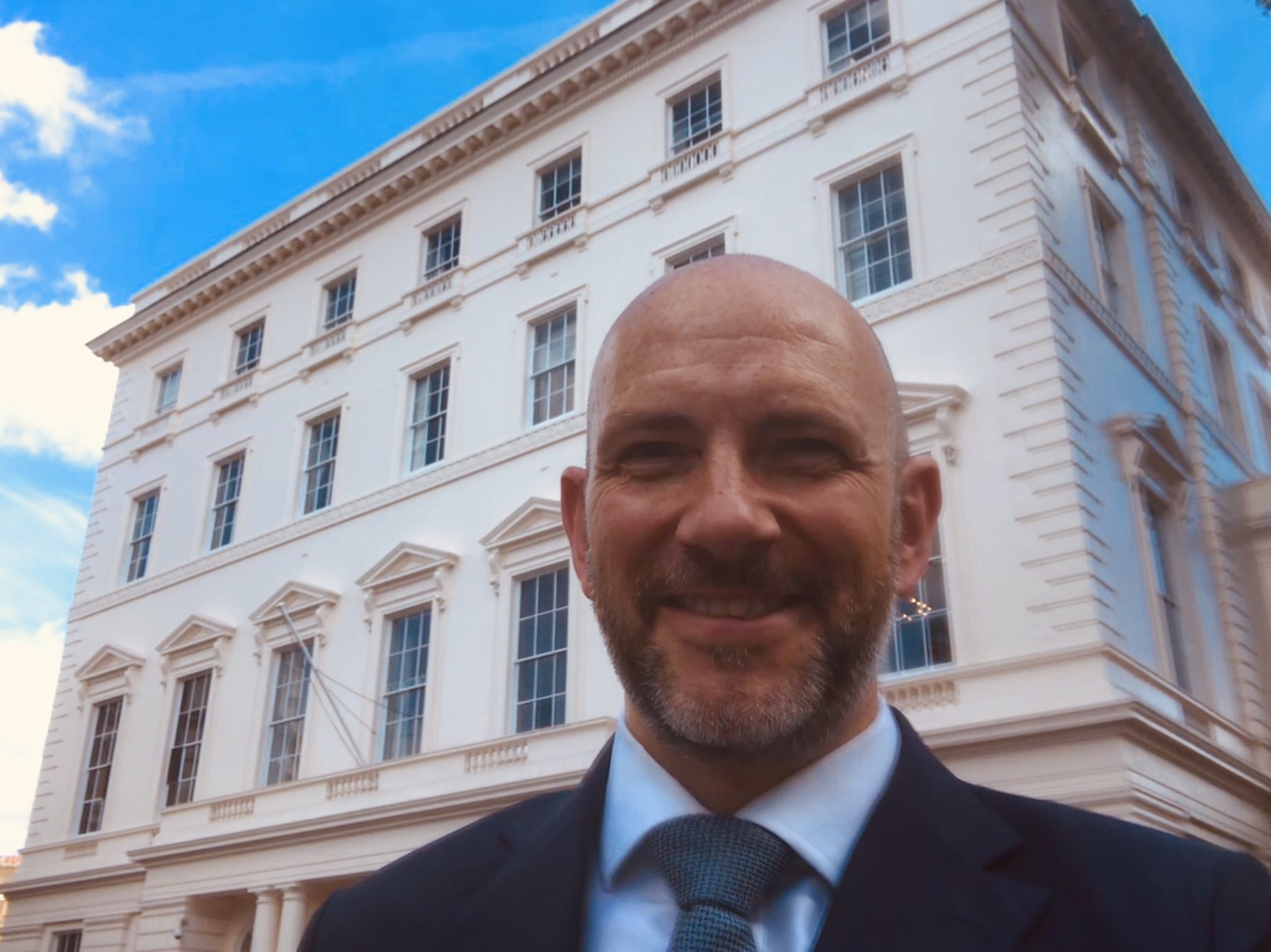 Simon Thomas, the United Kingdom's new ambassador to Croatia © Simon Thomas
Simon Thomas, the United Kingdom's new ambassador to Croatia © Simon Thomas
After over two years at this station, he spent time at the UK Mission to the United Nations in New York and the UK Representation to the European Union before being recalled to the UK to work in the field of counter-terrorism in the Cabinet Office.
After returning to the Russia department of the Foreign & Commonwealth Office for over two years, this time in a more senior position, he went back to New York for a couple of years to take up the First Secretary position of the UK Mission to the United Nations.
From there, he was promoted to Deputy Head of Mission at the British Embassy in Buenos Aires, Argentina, where he remained for over three years. Following another UK-based appointment, he again took up the position of Deputy Head of Mission, this time at the British Embassy in Harare, Zimbabwe, where he spent over two years.
In the period since, Simon Thomas new ambassador to Croatia returned to education. He earned a bachelor’s degree from the Royal College of Defence Studies where he spent a year studying strategy, leadership and international affairs alongside senior military and civilians from more than 50 countries. He has also been learning Croatian. He also holds a master's degree in International Security and Strategy from King’s College, London. He was awarded the title of Officer of the Order of the British Empire (OBE ) for merit in foreign policy in 2008.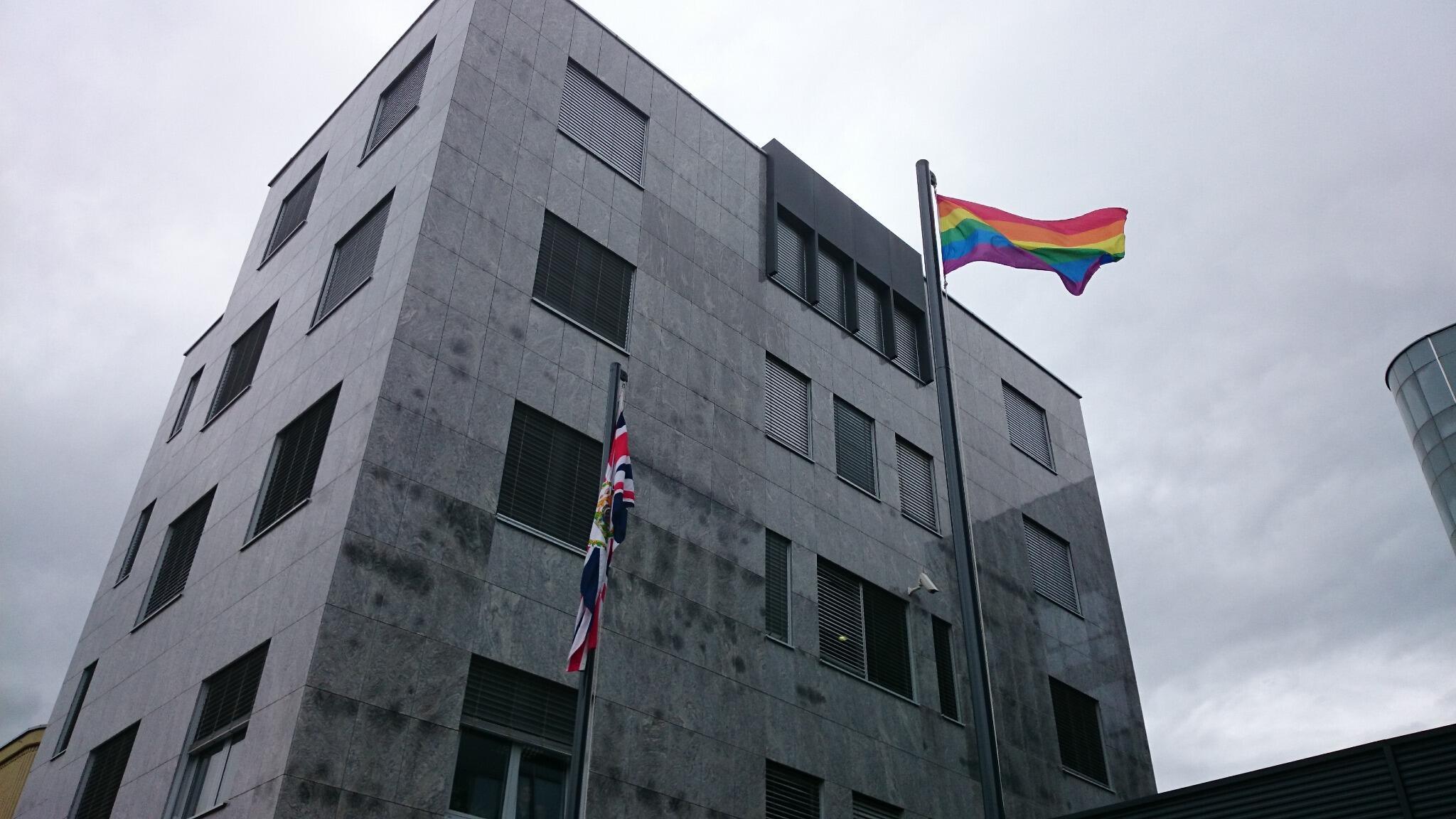 The Embassy of the United Kingdom in Zagreb © UK in Croatia
The Embassy of the United Kingdom in Zagreb © UK in Croatia
Simon Thomas new ambassador to Croatia tweeted “Delighted to be appointed the next United Kingdom British ambassador to Croatia, succeeding Andrew Dalgleish in July. Very much looking forward to getting to know Hrvatska and her people, and to deepening the great friendship between our two countries.”
The outgoing ambassador echoed his sentiments: “Excellent news of the appointment my successor, who takes over when I leave beautiful Croatia this summer,” tweeted the popular Mr Dalgleish, who will obviously miss the country he has called home for the last half-decade.
“Simon, get ready for one of the best jobs you could wish for!” furthered Mr Dalgleish. “Until then, I've still got so much to see and do!”
Mr Dalgleish will be transferring to another appointment within the United Kingdom Diplomatic Service. We wish him the best of luck and warmly welcome Simon Thomas new ambassador to Croatia.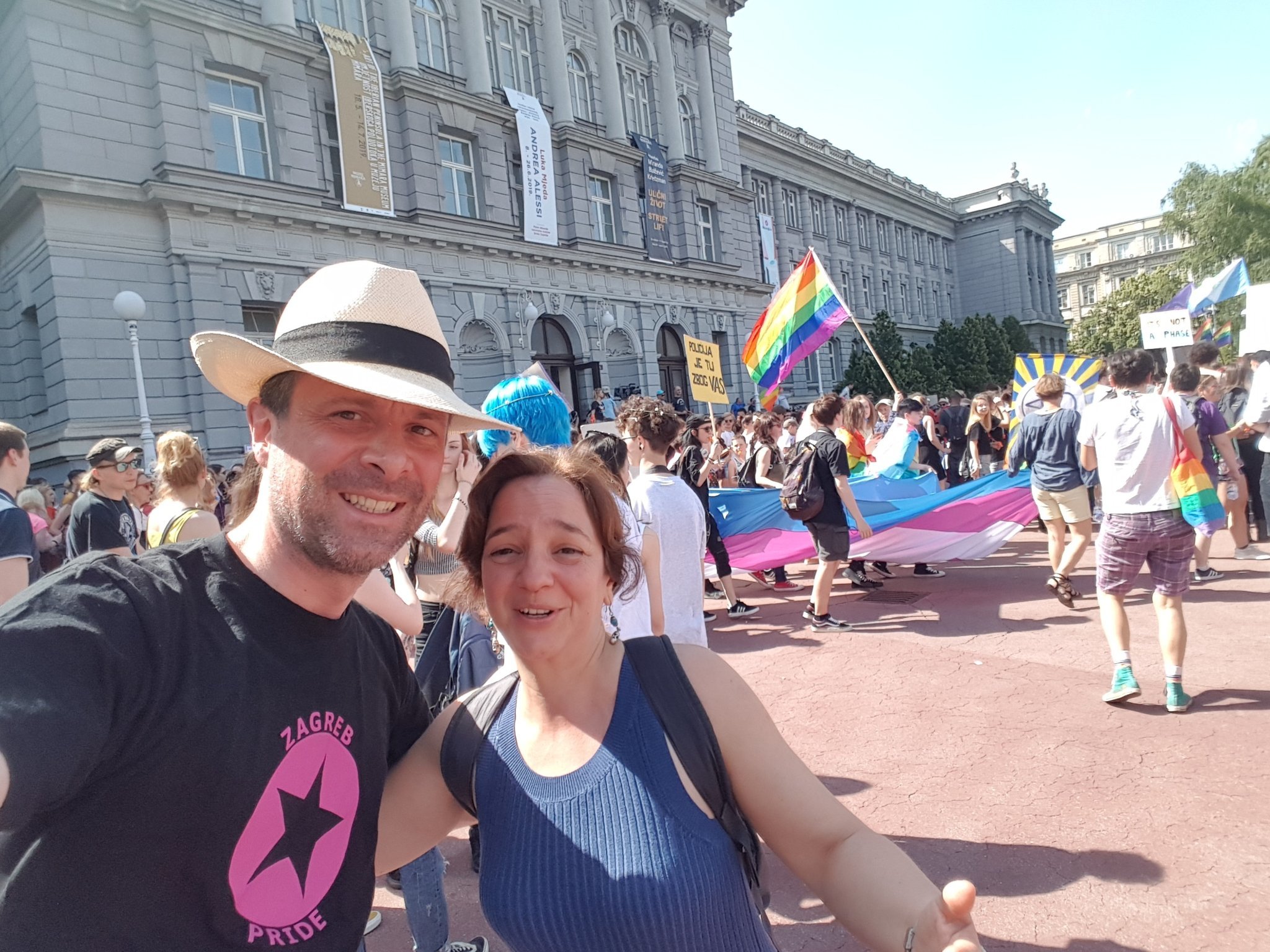 The outgoing United Kingdom ambassador to Croatia, the popular Mr Andrew Dalgleish, pictured with a colleague from the Spanish Embassy at Zagreb Pride in 2019 © Andrew Dalgleish
The outgoing United Kingdom ambassador to Croatia, the popular Mr Andrew Dalgleish, pictured with a colleague from the Spanish Embassy at Zagreb Pride in 2019 © Andrew Dalgleish
Brexit Brits in Croatia: Withdrawal Agreement Residence Explainer
December the 14th, 2020 - A clear and concise guide for Brexit Brits in Croatia wanting to make sure they retain all of the rights they have afforded to them being nationals of the EEA as the UK withdraws from the bloc. I want to apologise in advance for the sheer length of this article, but in order to set out everything needed, there was no way to make it shorter.
The UK's transition period is quickly coming to an end. The UK might have formally left the European Union on the 1st of February, 2020, but all EU law will continue to apply to the Northern European island nation until the 1st of January, 2021. After that, the laws of the bloc's instutions will cease to apply. The Withdrawal Agreement sets out the rights of citizens, both those of the EU living in the UK and those of the UK living in the EU, providing clarity in the very heart of the mother of all messes. Here is the Ministry of the Interior's latest advice to Brexit Brits in Croatia.
THE WITHDRAWAL AGREEMENT
As stated, the United Kingdom of Great Britain and Northern Ireland ceased to be a member state of the EU in an orderly manner upon entry into force of the Agreement on the withdrawal of the United Kingdom of Great Britain and Northern Ireland from the European Union and the European Atomic Energy Community (the Withdrawal Agreement).
The aforementioned Agreement determines a transition period until the 31st of December 2020, during which time British nationals and their third country family members continue to remain subject to current European Union law.
The Croatian Act on amendments to the Act on EEA nationals and their family members, which has been forwarded to the Croatian Parliament to face legislative procedure, will legally lay down the implementation of the part of the Withdrawal Agreement related to regulating the residence status of British nationals and their third country family members after the transition period ends at midnight on the 31st of December, 2020.
The aforementioned amendments will lay down clear rules for the procedure of applying for temporary or permanent residence for British nationals and the issuance of their subsequent residence permits, as well as the issuance of the necessary documents to frontier workers who will need special permits.
A DECLARATORY RESIDENCE SCHEME, NOT A NEW APPLICATION
The residence status of British nationals and their family members will be regulated pursuant to Article 18, paragraph 4 of the Withdrawal Agreement, which sets out a declaratory scheme only. This is extremely important to emphasise. You can freely find the corresponding article (PDF form) within the Withdrawal Agreement here, but to save you the bother of scrolling, I have included the most relevant information below in italic font:
4. Where a host State has chosen not to require Union citizens or United Kingdom nationals, their family members, and other persons, residing in its territory in accordance with the conditions set out in this Title, to apply for the new residence status referred to in paragraph 1 as a condition for legal residence, those eligible for residence rights under this Title shall have the right to receive, in accordance with the conditions set out in Directive 2004/38/EC, a residence document, which may be in a digital form, that includes a statement that it has been issued in accordance with this Agreement.
I need to quickly state that there is more information to be accessed under this Article which details more specific circumstances, but putting it all here isn't necessary, I provided a link to the Withdrawal Agreement in PDF form above should you wish to read further and in more detail.
Accordingly, British nationals and their third country family members who are subject to the Withdrawal Agreement will not be obligated to apply for a new residence status as a requirement for their legal stay in Croatia. Rather, a declaratory system will be applied on the basis of which British nationals and their family members will have a residence status on the basis of the very fact that they meet the conditions laid down in the Agreement and will continue to have the said status for as long as they meet these conditions. This means that their residence status is not subject to the constitutive decision of the competent authority.
REGISTERING AND THE ISSUANCE OF NEW RESIDENCE PERMITS
All the beneficiaries of the Agreement (Articles 9 and 10 of the Withdrawal Agreement) will have the possibility of registering their residence status given to them. After the procedure is concluded, they will be issued with residence permits confirming their new status. The registration procedure will apply to all persons regardless of whether they have regulated their residence status in the past on the basis of their EU-given right to the freedom of movement at a competent police administration/police station before the 31st of December 2020.
In addition to the relevant documents submitted for registration (depending on whether the British nationals and their family members in question held temporary or permanent residence in Croatia before the 31st of December 2020), the continuity of residence (Articles 11 and 15 (2) of the Withdrawal Agreement) and the condition of further stay in the Republic of Croatia will need to be determined as well.
The procedure for the registration of a new residence status will be simpler for the beneficiaries of the Withdrawal Agreement who already hold either temporary or permanent residence before the end of the transition period, as opposed to those persons who fail to do so by the said date.
REGISTRATION DEADLINES
It will be possible to submit applications at the competent police administrations/police stations according to the location of residence starting from the 1st of January 2021. The current deadline by which all beneficiaries of the Withdrawal Agreement will be able to apply is the 30th of June 2021. It will still be possible to submit applications after this deadline, however, the beneficiaries of the Agreement who do so might be fined for committing an administrative offense.
During the technical issuance of new residence permits, all beneficiaries will have to provide their biometric data. In accordance with the Proposal for the Act, previously issued residence permits will cease to be valid on the 1st of January 2021.
FRONTIER WORKERS
For the purposes of the Withdrawal Agreement, a frontier worker is a British national who has pursued an economic activity as a frontier worker in one or several EU member states in which they don't reside, and who continues to pursue this economic activity even after the 31st of December 2020. Frontier workers will be able to apply for the issuance of a document confirming their rights as a frontier worker. Much like with residence permits, it will be possible to submit applications at the competent police administrations/police stations according to the location of work starting from the 1st of January 2021.
EU LAW JARGON BUSTER
British citizens who already hold temporary or permanent residence in Croatia (those who hold the status or will be granted it under EU law before the 31st of December, 2020) will continue to be able to exercise that right.
Although all Brexit Brits in Croatia can legally remain and must register for a new document, differences will be made between existing permanent residents and temporary residents.
The new system is of a declaratory nature, it is not a brand new application for a new residence status. It is identity confirmation to prove that you are entitled to these acquired rights and nothing more.
You must register for your new status before the 30th of June, 2021 if you are within the scope of the Withdrawal Agreement (if you held residence in Croatia before the end of the transition period), if you fail to do so, you could face a fine.
The new residence document/card/permit Brexit Brits in Croatia who are within the scope of the Withdrawal Agreement will receive will state ''Nositelj prava čl. 75. st. 1. Zakona EGP'' (Holder of the right of Article 75 point 1 of the Law on the EEA) as opposed to the current EGP (Europski Gospodarski Prostor/European Economic Area).
The Withdrawal Agreement stipulates that those who hold permanent residence in an EU country can leave for up to five consecutive years without losing any of their rights in their host state. This includes Croatia.
This is a detailed article on residence for Brexit Brits in Croatia only, for more on driving licenses, healthcare and crossing the EU's external border, click here for the British Embassy's advice. Sign up for email alerts from the British Government's Living in Croatia page, follow the British Embassy on Facebook here, and keep up with MUP in English language here.
British Embassy in Zagreb Publishes Latest Foreign Office Travel Advice
March 23, 2020 - The British Embassy in Zagreb has published the latest travel advice in the light of border closures and coronavirus.
The British Embassy in Zagreb has published the latest official travel advice for British nationals from the Foreign Office, which you can find below.
The British Government strongly advises the immediate return to the UK of all British travellers overseas in these uncertain times of border closures and the spread of coronavirus.
Although most flights have been grounded and there is a 30-day closure of EU borders, there ARE still flight options from Zagreb to London, due to the interim Brexit relationship with the EU. It is my understanding that there are flight options with both Croatia Airlines and British Airways, but please check with the airlines for the latest. For the latest Croatia travel update in these very uncertain times, here is today's TCN overview.
And now, to that Foreign Office advice:
Exceptional travel advisory notices
Return to the UK now if you’re travelling abroad
The Foreign & Commonwealth Office (FCO) advises British people travelling abroad to return to the UK now, if commercial flights are still available. This advice was published on 23 March and takes effect immediately.
International travel is becoming very limited as air routes close, land borders close and new restrictions are put in place that prevent flights from leaving.
If you’re travelling abroad, you should:
- contact your airline or travel company now
- keep up-to-date with our travel advice pages. We are updating information on returning from the country you’re in as quickly as we can
We are working with airlines to keep routes open, and calling for international action to to keep routes open to enable British people can return home on commercial flights. We are also working around the clock to support those British travellers who are already finding difficulties to come back to the UK.
Read the full advice on the FCO website.
You can follow the British Embassy in Zagreb on Facebook.
Brexit Brits in Croatia: Outreach Meetings Scheduled in Dubrovnik and Split
As the majority of you will know, I've been writing articles to try to keep you up to date with Brexit and the unfolding situation over in the United Kingdom.
Numerous articles have been written to update, inform and attempt to answer your questions on what Brexit with or without a deal means for you as a British citizen with legal residence in Croatia.
The first article, which can be read here, covers what would happen if Theresa May's deal (withdrawal agreement) is adopted by British Parliament.
The others cover the situation as it unfolded. As individual EU member states came forward with their proposals for UK citizens following the UK promising to protect EU citizens in any scenario (be it deal or no deal), and after a request for a ''generous and pragmatic'' offer from the EU, Croatia finally shed some light on the situation here, citing special measures.
With little else to go on, we wrote an article on the steps British residents in Croatia affected by Brexit can take to ensure they're secure. You can read that here.
Eventually, MUP spoke out and offered guidelines in the event of any Brexit scenario, this echoed much of what we had already written. It can be read here and also contains our advice written in italic font. Here is the original on their website.
For a breakdown of the legal jargon which surrounds this issue and what it all means in the real world, click here.
Given the fact that very little help is being offered to Brits living in the rest of the EU in general, a generous sum was allocated to help out those who are struggling with residence applications and registrations forms.
As Theresa May stepped down after her withdrawal agreement was rejected three times by parliament, Boris Johnson entered Number 10 and prorogued parliament. Until MPs managed to pass a law making no deal illegal, the threat of a no deal Brexit became very real once again. That is now unlikely again, and a further extension is expected, but just in case it happens, click here for all you need to know.
Please note that there is no need to panic as long as you are a British citizen correctly registered and with a valid residence permit of either type (privremeni boravak/temporary residence or stalni boravak/permanent residence). If you hold permanent residence already, there is nothing for you to be concerned about.
I keep seeing very concerning comments from various individuals about people being ''kicked out'' of countries, this simply is not true. Croatia has made it quite clear that it will protect its legal British residents regardless of the outcome of Brexit, through transitional arrangements that will have no end date. This will allow you to continue your life in Croatia exactly as you did before.
If there is a no deal Brexit, all you will need to do is exchange your residence card for another one, but its validity and type will remain exactly the same. If you hold permanent residence, it will still be permanent residence. Much more detail on that is provided here.
If you are a British citizen living in Croatia and you have not yet registered your residence, please do so as soon as possible in order to have your rights protected.
We'd like to announce that the British Embassy Zagreb will be holding an outreach meeting for British citizens living in Split on October the 12th, 2019, and then again in Dubrovnik on October the 14th, 2019.
The locations and times will not be shared publicly, but will be provided to all those British citizens living in Croatia who register that they'll be attending either the Split or the Dubrovnik outreach meetings by contacting the email address provided below.
You need to register that you'll be attending by emailing This email address is being protected from spambots. You need JavaScript enabled to view it.. You'll then be provided with the exact times and locations of the meetings. Please specify which one you'll be attending, and remember to bring your British passport along with you as a means of identification and as proof of your British citizenship.
Make sure to follow our dedicated politics page for more information on Brexit as we get it, and much more.
VIDEO: British Ambassador Shares Message to Brits in Croatia
October the 2nd, 2019 - Last night, a meeting between affected British expats living in Croatia and British Ambassador to Croatia, Andrew Dalgleish on the topic of citizen's rights took place in Zagreb.
During the meeting, which took place between 18:00 and 20:00, numerous questions were raised by concerned British expats and the ambassador did his best to answer them. We have also covered the topic of Brexit and what that means for British citizens living legally in Croatia extensively and numerous times.
Updated information on what a potential no deal Brexit would mean for British nationals living in Croatia can be found by clicking here.
Our advice, as well as that directly from MUP (Ministry of the Interior), can be read here.
If you are a British national who has legal residence in Croatia, be it temporary or permanent, you will be covered by transitional measures which will have no end date, allowing you to continue your lives in Croatia just as you did before the UK's withdrawal from the EU. All you will need to do is exchange your current residence permit for a different one within twelve months following a no deal Brexit date.
Please note that the new cards are not another application procedure, but merely a formality. You can read much more detail on that here.
If you're a British national and for some reason or another you have not yet registered your residence with the local police, make sure to do so as soon as possible as an EU national in order to be covered by the aforementioned transitional measures with no end date, and avoid needing to apply as a third country national following (what is currently) expected to be Brexit day - October the 31st, 2019.
Watch Andrew Dalgleish's video, which touches on the appropriate legislation on both residence and healthcare here:
Make sure to stay up to date with the UK Government's Living in Croatia page for updates, follow British Embassy Zagreb on Facebook, and stay up to date with us on our politics page as we update you on any further news on Brexit that may affect you.
British Embassy in Zagreb Celebrates Queen's Birthday, Moves Beyond Plastic
One of the most eagerly anticipated Zagreb parties of the year took place at the British Embassy in Zagreb on June 6, 2019, as the Queen's birthday was celebrated along with a message #BeyondPlastic.
I think that if there was one event in the Zagreb calendar I could choose to enjoy pleasant company and catch up with MANY people all in one go, it would have to be the Queen's Birthday party, hosted each year at the residence of British Ambassador, His Excellency, Andrew Dalgleish.
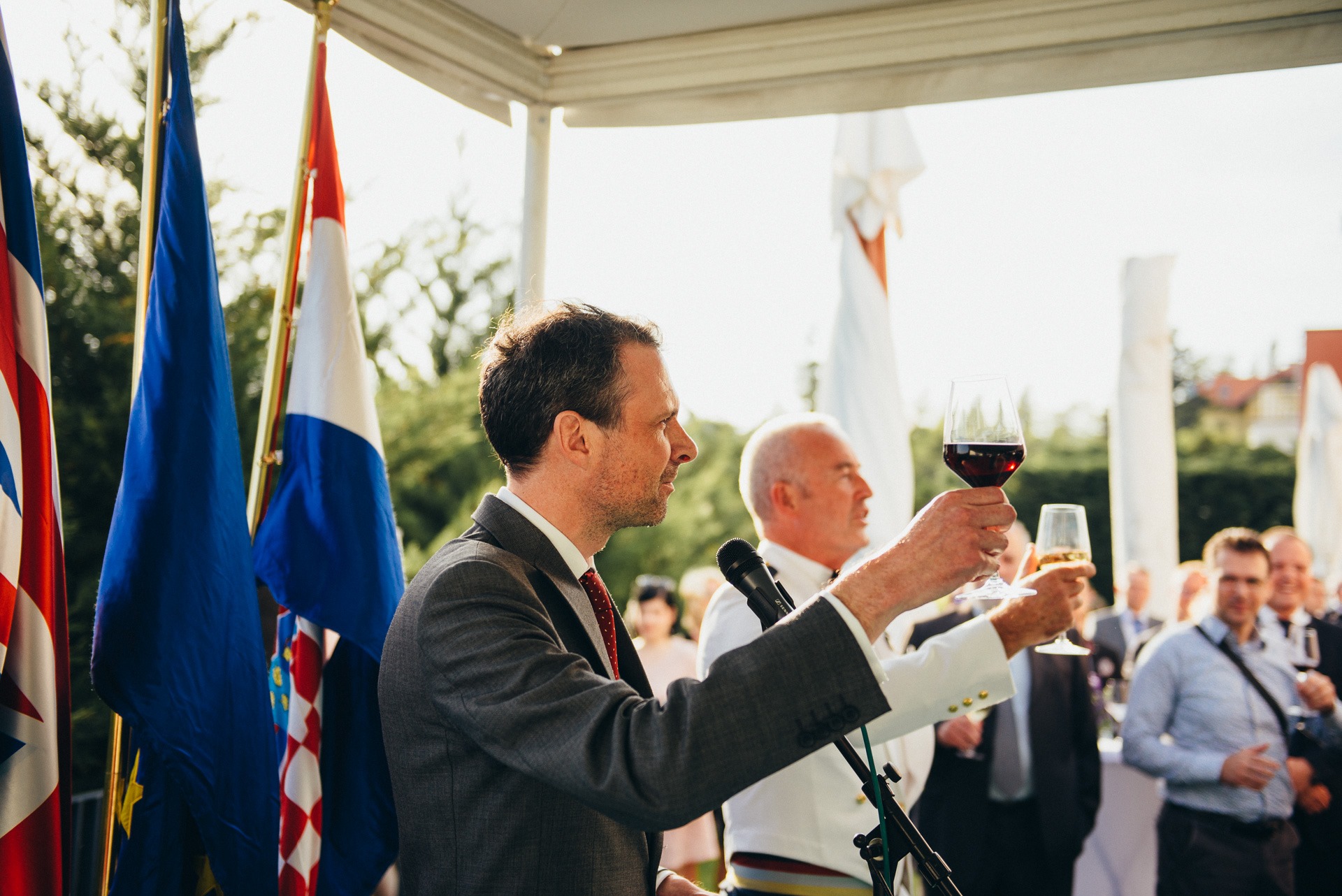
I am sure the quality and free availability of the gin plays a part for this correspondent, but the turnout is always excellent, the company engaging, and the ample ambassadorial gardens a pleasure to walk around.

This year's celebration was no exception, and popular Ambassador Dalgleish spent the evening doing the rounds and ensuring his guests were enjoying themselves.
The Ambassador's speech (listen to it above) focused on the bonds that connect Croatia in the UK. He joked that he had expected last year's speech to be the last as a member of the EU, but that he was still he. He also showed off his famous socks, having lost a bet with the Croatian ambassador to London last July, whereby the ambassador on the losing side of the World Cup semi-final committed to wearing the socks of the opposing country the next day.
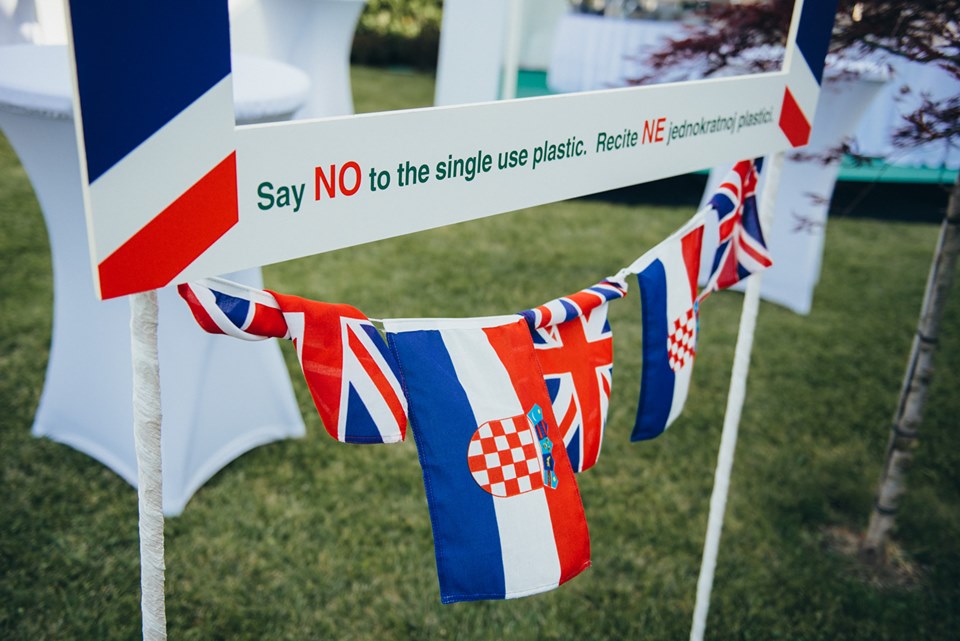
In addition to celebrating Britain's longest-serving monarch, the British Embassy was also pushing its #BeyondPlastic campaign, to highlight the need for drastic action regarding single-use plastic. With more than 8 million tons of plastic dumped in the world's seas last year alone, the situation is alarming, and the British Embassy is running a campaign to encourage the banning of all single-use plastic.
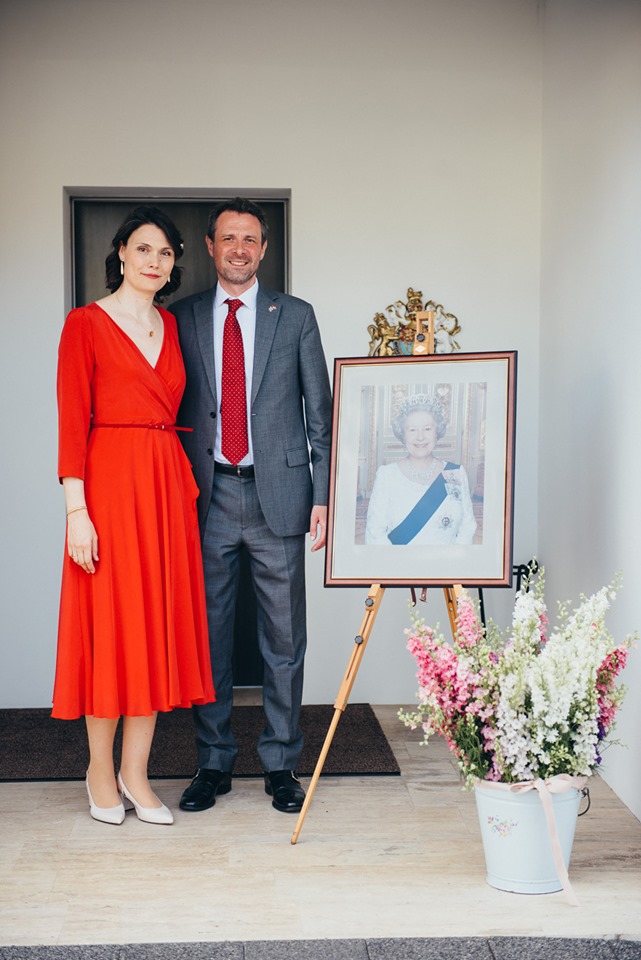
Some more photos taken by expert photographer Goran Hrubi, who clearly imbibed less gin than myself...
You can follow the British Embassy in Zagreb on Facebook.
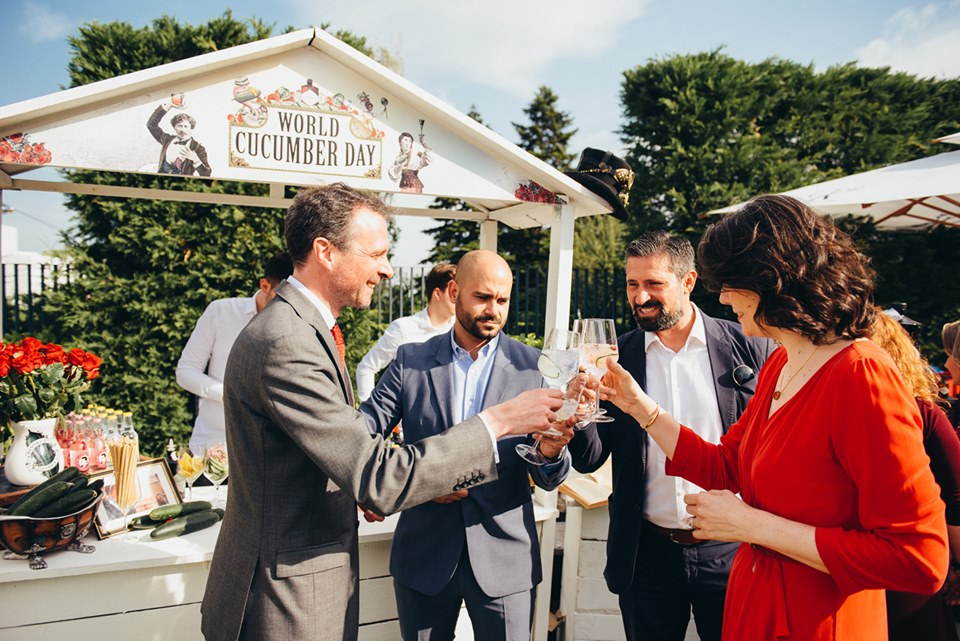
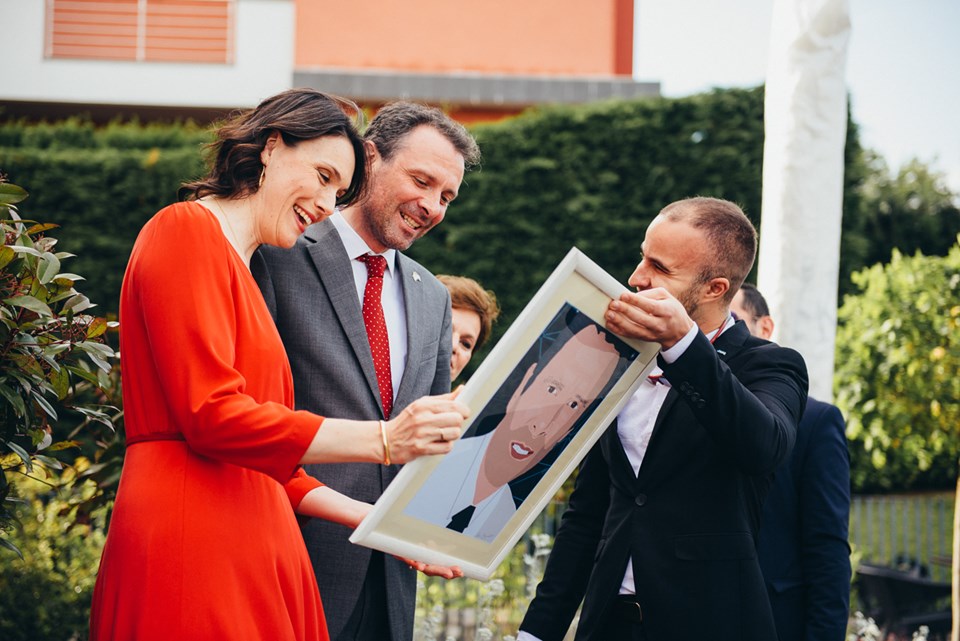


Brexit Brits in Croatia - Simplified Jargon for Croatia's British Residents
A look at the possible Brexit scenarios and what they mean for Croatia's confused British residents.
Brexit has been delayed. If May can't get her deal through parliament, or if no other way forward is proposed, the UK could end up with a disorderly No Deal exit, despite parliament having voted overwhelmingly against it. If May passes her deal or parliament finds another route and that is passed then Brexit has been delayed until May the 22nd to allow for the necessary legislation to be passed. The UK cannot delay Brexit any further unless it agrees to partake in the European elections. Farcical, no?
Anyway, La La Land, sorry... I mean Britain, aside, let's see how things currently stand for Croatia's resident Brits. I've tried to update you a lot, but as you know, the Brexit situation has changed more times than Boris Johnson has changed his political beliefs, so it doesn't always mean much. Still, let's give it a go.
May's deal/withdrawal agreement passes:
If, in the unlikely event May's deal passes during the third meaningful vote on it (third time lucky?), then the withdrawal agreement concluded back in 2018 will come into force on May the 22nd this year, giving way to a transition (implementation) period until what we currently believe to be the end of December, 2020. This however, could be extended and altered.
What does this mean?
It means that you need to make sure you're correctly registered with the authorities (MUP/Ministry of the Interior) as a resident in Croatia. You need to be in possession of a valid residency permit or the white piece of paper proving you've been approved and you're just waiting for it to be made, before December 2020. If you're due to gain permanent residency (after five years of continuous, lawful residency in Croatia), you can apply for it as an EU citizen would during this time. In short, nothing will alter.
Here's a more detailed guide I wrote a few months ago.
May's deal fails again, parliament can find no way forward, No Deal occurs:
This remains unlikely as this is only the desire of a handful of people who seem hell bent on such an insane idea. Still, it could happen. You need to make sure you're correctly registered with MUP as stated above, and your registration, receipt of registration and/or residence permit will act as proof of your British citizenship and proof of you having been resident in Croatia before the UK's withdrawal from the EU. It's hugely important that you do this if you haven't already.
Here's how you should prepare for all scenarios, this guide will help you make sure you're on the right side of the law should the UK crash out of the EU with no deal next month.
Here are MUP's guidelines, with our explainers and points thrown in, in the case of a No Deal Brexit. Croatia has now finally confirmed it will protect British citizens living legally in Croatia and minimise any disruption as much as possible regardless of the Brexit outcome. Click the above link and read carefully. Here's MUP's original post on the subject.
Is there any new information?
Yes and no. Here's what we know so far: Croatia has committed to protect its British residents regardless of the outcome, which is good news. You can click here for an overview of each EU member state's guidelines for residence rights for Brits in the unwanted event of the UK leaving without a deal. It isn't in alphabetical order, so scroll down until you find Croatia, or don't, because I'll just write what you need to know here and explain each point as necessary anyway. Here goes:
''In order to provide for the regulation of residence status of UK nationals and their family members, who on the day of departure of the UK from the European Union have already registered their temporary or permanent stay or have been issued with a residence card pursuant to Title X of the existing Aliens Act, certain amendments to the draft proposal for the Act on EEA nationals and their family members have been proposed.
Those provisions provide for keeping the existing residence status and lay down the right to work without obtaining additional authorisation (this provision will have no end date).
The residence documents already issued under the existing Aliens Act will be recognised as temporary national residence permits for nationals of the United Kingdom and their family members after Brexit (option c). These temporary national residence permits will be valid maximum up to one year from the entry into force of the Act (or until their expiration date, if the said date is shorter).
An obligation has also been prescribed to replace residence documents within a year from the entry into force of the Act. New residence permits will be issued in the format laid down by Regulation 1030/2002.
Pursuant to a special procedure, the draft Act will be sent before the Croatian Parliament for urgent legislative procedure.
b). On 19 March 2019 total of 655 UK nationals have regulated their residence in the Republic of Croatia (358 on temporary residence and 297 have permanent residence).
Having this in mind, we do not currently expect overburden of our administrative capacities.
We aim to implement a simple and straightforward procedure in order not to overburden UK nationals.
Therefore we are considering accepting applications for exchanging the recognised temporary national residence permits after 30 March 2019 (or no deal Brexit date) and issue first permits in accordance with Regulation 1030/2002 afterwards (in order to replace any temporary documents).
c). We have made a proposal for a recommendation addressed to all UK nationals and their family members residing in the Republic of Croatia who intend to continue residing in the Republic of Croatia, to register their residence in the Republic of Croatia in line with the provisions of the existing Aliens Act.
This recommendation was published on the website of the Ministry of the Interior https://mup.gov.hr/vijesti/information-concerning-the-future-relations-between-the-united-kingdom-and-the-european-union/283273
What does all that mean?
In short, legislation is being put forward to mean that the current residence document/permits you hold now, which were obtained via your EU treaty rights (the right to live and work in any EU member state) will remain valid for one year, or less if you're due to update them (renew or apply for permanent residence) in less than one year.
This legislation will mean that essentially, British citizens already residing legally in Croatia will be treated like all other EU citizens and their unrestricted entitlement to access the Croatian labour market will remain as it is now - permanently.
There aren't many Brits living here, so there shouldn't be any particular extra burden felt by MUP or by individuals.
Eventually, residence cards obtained through EU law will cease to be valid for British nationals, but there's nothing to worry about, you simply exchange them for whatever the new ones will be. Croatia is considering beginning permit exchanges as of the 30th of March (however this might be worth bypassing considering the fact that the UK will almost certainly still be a member of the EU on that date).
Need an example?
1) Let's say you're due to get permanent residency this year. You'll apply for it as normal just like you were still an EU citizen, and you'll be granted under the same conditions as EU nationals. Ask the official if you'll need to alter it in a year's time. If you do, you won't be asked to make an application again, it will be a simple exhange for a new permit. It will still be permanent residence, just maybe a slightly different looking card.
2) You've still got a few years to go before you hit that magic five year mark. Your current temporary residence permit will remain valid for another year. Go and exchange it for whatever the new document will be as soon as MUP announce they're beginning exchanges to save you any extra burden. Ask at your local police station for information on this, or send an email to This email address is being protected from spambots. You need JavaScript enabled to view it..
3) Let's say you've somehow managed to live in Croatia without any sort of residence permit (yes, it happens), you need to go and register your residence now and get a five year temporary residence permit. You can then exchange it for whatever the new document is when MUP begins exchanging cards, and then eventually get permanent residence.
What about healthcare?
If no other way forward is found and no further extension to the Brexit process is agreed, the UK will crash out of the EU. In this case, the EU health insurance card will cease to be valid for British citizens. As things stand, we can reveal that the Croatian Government is preparing a Draft Law Proposal on a Temporary Measure in the area of Obligatory Health Insurance designed to provide transitional healthcare arrangements after the UK leaves the EU to those who are residents in Croatia.
We'll update you as soon as we know more about what that means.
Make sure to follow British Embassy Zagreb on Facebook, and sign up for email alerts from gov.uk's Living in Croatia page, which is updated as soon as any new information comes out. Give our dedicated politics page a follow for much more on Brexit and beyond.
Brexit Brits in Croatia - MUP's Guidelines in Event of Any Scenario
MUP has finally spoken!
Where do things stand for you as British citizens lawfully resident in the Republic of Croatia?
* When this article was first written, it was a draft law. This law was fully adopted in July 2019 and will come into force in the case of a no deal Brexit*
If you see a little * and italic font at the end of or underneath a sentence written by MUP, that's our little comment to give you our advice on the matter, too.
RESIDENCE:
Residence registration is very important in the case of any scenario for future relations between the European Union and the UK.
Therefore, all UK citizens and their family members residing in the Republic of Croatia are strongly recommended to register their residence as a British/EU citizen/apply for a residence card as a family member of a British/EU citizen.
Please click here and click on the following links: Form 1b, (for EU citizens, this needs to be clicked on for British nationals too) Form 2b (for family members of EU/British citizens who are third country nationals), of Form 3b for both EU/British citizens and his/her family members who want to apply for permanent residence.
* Please note that permanent residence can be applied for only after five years of lawful, uninterrupted temporary stay in the Republic of Croatia, you can have changed your address as many times as you like, but you must have been registered as legally living on Croatian territory for five years on an uninterrupted basis. Lawful, uninterrupted residency can be shown when applying for permanent residence with every ID card you've held, as the dates on them will attest to the five year time period. Some MUP officials claim you cannot apply for permanent residence until your temporary residence expires, others say you must be in possession of a temporary residence card which is still valid at the time of application. We advise you go to MUP and ask about your case individually, as they seem to alter this rule depending on who you talk to.
* According to EU law, the right to permanent residence ''after five years'' actually means five years + one day, but once again, MUP can misinterpret this and assume you need to come and start the process before the temporary residence expires. Don't leave it up to fate. At least go and ask in person before your temporary residence card expires.
* If you were not given an automatic five year residence permit when you first applied for some reason or another, and when you've renewed your temporary residence the official has taken your old ID card from you, there is no need to worry. Present the ID card you have and your legal residence will show up when a case worker checks you out to approve your permanent residence application.
Once the applicants have completed the registration of a temporary residence in accordance with the provisions of the Aliens Act (OG 130/11, 74/13, 69/17 and 46/18), they will be immediately issued with a Registration Certificate registration of a temporary residence in paper form, free of charge. If they wish, they can apply for a residence card (for which the administrative fee is to be paid in the amount of HRK 79.50).
* We strongly recommend you pay for the residence card, the white sheet of paper is merely confirmation of your residence/address, the residence card has your photo and details on it and acts as ID in Croatia. It is also weatherproof and easier to carry around on your person, which, just like nationals, you must and can be fined for not being able to present a form of ID if asked to by the police.
UK citizens who apply for permanent residence will be issued with residence cards (for which the administrative fee is to be paid in the amount of HRK 79.50).
Family members of UK nationals, who are not nationals of an EU Member State, are required to apply for a residence card/permanent residence card as a family member (for which the administrative fee is to be paid in the same amount of HRK 79.50).
UK citizens and their family members can register their residence at a police administration/police station according to their place of residence (The list of police administrations/police stations is available here).
The registration of residence and the relevant documents are a clear proof that their holder is a citizen of the United Kingdom or a family member [of said British national] who has already resided in the Republic of Croatia before the United Kingdom's departure from the European Union.
DRIVING LICENSES:
Starting from the day on which the United Kingdom of Great Britain and Northern Ireland leaves the European Union, UK driving licenses will be subject to regulations concerning foreign driving licenses.
UK driving licenses will be valid in the Republic of Croatia for up to one year from the day that the United Kingdom of Great Britain and Northern Ireland leaves the European Union. After that, they will have to be replaced with Croatian driving licenses and the applicant will have to submit a certificate of medical fitness to drive.
UK nationals and nationals of other countries who are holders of UK driving licenses are advised to apply for the replacement of their driving licenses with a Croatian driving license as soon as possible.
Applicants who submit their application before the date on which the United Kingdom of Great Britain and Northern Ireland leaves the European Union will be able to replace their UK driving licenses under the conditions set for the replacement of EEA driving licenses in which case it is not necessary to submit a certificate of medical fitness to drive.
Both the EU driving licenses and the former paper driving licenses are equally recognised.
UK driving licenses are replaced with Croatian driving licenses without any obligation to take a driving exam/test, regardless of the category of vehicle listed on the UK driving license.
Border checks on persons at the EU external border (This section does not apply for travel in the Common Travel Area between the United Kingdom and Ireland):
EU law on border checks at the EU external borders on persons distinguishes between the control of EU citizens and of third country nationals. As of the withdrawal date, the control of UK nationals on entry and exit from the Schengen area as well as to and from Member States for which the decision on lifting internal controls has not yet been taken, but which apply Schengen rules at their external borders, will follow the rules for third country nationals.
(Please note that UK nationals who are members of the family of an EU citizen exercising their right to free movement are subject to the rules set out in Article 5 of Directive 2004/38 / EC of the European Parliament and of the Council of OJ L 158, 30.4.2004, p. 77.) On 29 April 2004, the right of citizens of the Union and their family members to move and reside freely within the territory of the Member States, OJ L 158, 30.4.2004, p. 77.)
This means that they will no longer enjoy facilitations at the borders provided for EU citizens, nationals of the contracting states of the European Economic Area, and Swiss nationals ("EU / EEA / CH citizens") related to the free movement rights. In particular, UK citizens will not be entitled to use the separate lanes provided for EU / EEA / CH citizens to carry out checks at border crossings and will be subject to thorough checks of all entry conditions for third country nationals upon entry.
The entry checks for UK citizens will include verification of:
The possession of a valid travel document for crossing the border; the document must have a validity of no more than ten years, and shall remain valid for three months after the intended departure from the Member States; (Please note that UK national passports issued before the withdrawal date remain valid travel documents).
The duration of the stay:
For short stays in the Schengen area, UK citizens will be subject to restrictions on the authorised duration of stay within the Schengen area (with a maximum of 90 days in 180 days); for long stays, they will in principle require a residence permit or a long-stay visa issued by national authorities, under the national rules; The identity and the nationality of the third country national and of the authenticity and validity of the travel document for crossing the border, and in particular, if an alert has been issued in the Schengen Information System (SIS) for the purpose of refusing entry and checking potential threats to public policy, internal security, public health and international relations; the purpose (eg tourism or work) and the conditions of the intended stay (eg accommodation, internal travels); the existence of sufficient means of subsistence (i.e. having sufficient means to pay for the intended stay and return travel). ("Schengen-visa"), when the transitional period for the stay in the United Kingdom is reduced by the amount of the short-stay visa ("Schengen-visa"), on 13 November 2018 the Schengen area is 90 days within a 180-day period and it is now up to the European Parliament and the Council to adopt this proposal. - visa requirements, following the visa reciprocity principle.)
Travelers are advised to confirm, prior to travel, the validity of travel documents and to ensure that they fulfill all the above conditions before they travel to the EU. The non-fulfillment of any of the entry conditions may result in refusal of entry issued in accordance with the procedure laid down in Union law with respect to third country nationals.
Checks on exit include verification of:
The possession of a valid travel document for crossing the external border; verification that the person did not exceed the maximum duration of stay in the territory of the Member States; relevant databases similarly as upon entry checks.
WHAT DOES THIS JARGON ACTUALLY MEAN?
In short, this is nothing we haven't advised before and we applaud MUP for confirming things.
Make sure you're registered and in possession of a residence card which acts as proof of your lawful residence in the Republic of Croatia before the United Kingdom's withdrawal (if it ever happens) from the EU. In other words, these act as your acquired rights that you were entitled to before a law change, ie, your EU treaty rights.
Apply for permanent residence when you hit the magic five year mark.
Switch your driving license over to a Croatian one now, even though you don't need to right away, why bother with the headache?
You won't be able to use the EU lanes when arriving in an EU country using a British passport anymore.
Croatia is not in Schengen, but when travelling to and from Schengen, you might be subjected to more questions than you're used to.
If your passport is nearing its end, apply for a new one now to save you the bother.
We'd like to thank MUP, all sarcasm aside, for setting out some guidelines. This means that all Brits who have legally resided in Croatia, still live here, and have proof of that, will be fine even in the event of a No Deal Brexit. If May's Withdrawal Agreement manages to pass, then that will come into force. Click here to read that. If Brexit is delayed (likely), or Article 50 is revoked (unlikely, but possible), keep up with us for info.
Make sure to follow our dedicated politics page for much more on Brexit. Sign up to email alerts from the British Embassy in Zagreb for any alterations. Click here for MUP's post.

